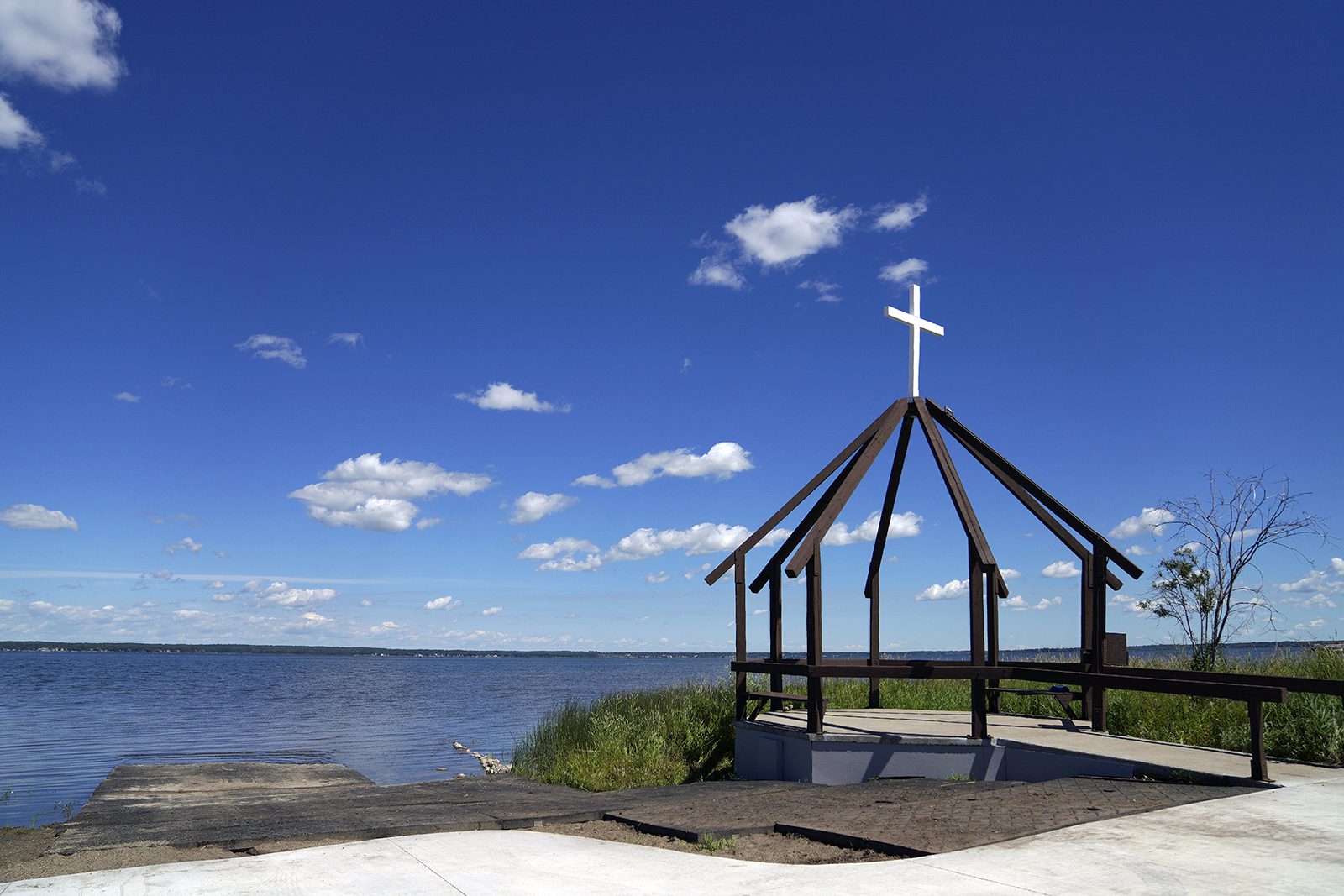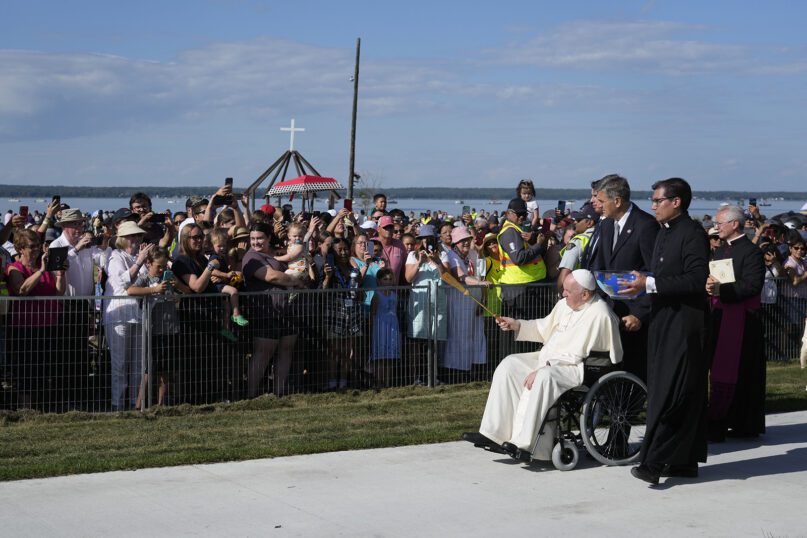LAC STE. ANNE, Canada (RNS) — On the shores of the largest Indigenous pilgrimage site in North America, Pope Francis praised the role of grandparents in preserving faith and tradition Tuesday (July 26), while continuing his visit of healing and reconciliation in Canada.
“You possess a treasure!” the pope told families who gathered with grandparents at the sacred site, a large lake in central Alberta, Canada, about an hour south of Edmonton. “Guard this source of life within your homes: Take care of it, as a precious legacy to be loved and cherished.”
Francis’ words took place on the third day of his apostolic visit to Canada (July 24-29), centered on reconciliation with the First Nations, Métis and Inuit communities. The pope’s “penitential pilgrimage” seeks to restore trust with Indigenous peoples and apologize for the church’s programs aimed at cutting them off from their history, families and culture.
Tuesday, the feast day for St. Anne, marks the beginning of an annual pilgrimage to Lac Ste. Anne, previously called “God’s Lake” by Indigenous peoples. Almost 40,000 people typically partake in the pilgrimage, including many First Nations peoples.
St. Anne, revered by Catholics as the grandmother of Jesus, is a beloved figure to many Indigenous Catholics who cherish the elderly in their communities. Missionary Joseph Lestanc (1830-1912), an Oblates of Mary Immaculate priest, is credited with turning the lake — credited by Indigenous peoples for its healing powers — into a Catholic pilgrimage site. In time, it has grown to become the largest pilgrimage site in North America.
From his wheelchair, Francis blessed the lake’s waters and the faithful who gathered. The pope’s knee pain has forced him to sit in a wheelchair for the majority of the trip. In keeping with Indigenous tradition, Francis made the sign of the cross according to the four cardinal directions.
In his speech, he praised the work of those missionaries who “preserved Indigenous languages and cultures in many parts of the world.”
“The church, too, is a woman, a mother. In fact, there has never been a time in her history when the faith was not passed on in mother tongues, passed on by mothers and grandmothers,” he said.
Pope Francis also underlined the need for healing. “In this blessed place, where harmony and peace reign, we present to you the disharmony of our experiences, the terrible effects of colonization, the indelible pain of so many families, grandparents and children.”

The Lac Ste. Anne pilgrimage site in Alberta, Canada, on July 20, 2022. (AP Photo/Jessie Wardarski)
He especially mentioned the “painful legacy” that resulted from Indigenous grandmothers’ not being allowed to transmit their traditions to their children. Government-led programs such as residential schools, aimed at separating Indigenous peoples from their roots, continued in the country until the late 1990s. On Monday, Pope Francis repeated his apology for the role that the Catholic Church played in implementing these programs.
The pope told the many Indigenous people gathered that their “presence here is a testimony of resilience and a fresh start, of pilgrimage towards healing, of a heart open to God who heals the life of communities.”
RELATED: At Indigenous church, Pope Francis lays out his vision for reconciliation in Canada
He also called on the church to heal from its temptation “defending the institution rather than seeking the truth, of preferring worldly power to serving the gospel.” Instead, he called for “a church that is open and speaks to everyone; a church that is against no one, and encounters everyone.”
“In this way, through the good they can do for others, they will discover their own streams of living water, and the unique and precious treasure that they truly are,” he added.
Chief Tony Alexis of Alexis Nakota Sioux Nation was among the Indigenous delegation that visited Pope Francis at the Vatican in 2016 and invited him to visit Lac Ste. Anne and pray for his people. Alexis told Religion News Service that for many pilgrims the pope’s visit “is a prayer answered,” but much more still needs to be done.
“We need the international community to really help and support Indigenous communities here,” he said, mentioning the “atrocity” of residential schools in Canada.
“Some kids never made it home, some kids had to come home to tell their parents that their other child died and didn’t make it home,” he added. Alexis is among the many Indigenous calling for Vatican and government records on Indigenous people to be released “so we get to see the truth of what’s there,” he said.
“The rest of the church needs to support what he is doing right now,” he said, “because healing has to happen in our community.”
“It’s not only healing for our people, but it’s also healing for our church,” he added.
Chief Peter Powder at Mikisew Cree First Nation said he had “mixed feelings” about Pope Francis’ apology on Monday. The church needs “to be accountable for all the hurt that was brought to our communities,” Powder said.
In Powder’s community a lot of the language and culture has been lost and some of its members have been abused or suffer from lasting trauma, he said. “Apologies really mean nothing to them; it’s the actions that come after them that matter,” he added.
Powder escaped a residential school with his brother and sister, because of the mistreatment he said he suffered there. “We ran away and we never went back,” he said, adding that he doesn’t remember when that happened and can’t have access to the records that show it.
On Monday the pope also supported investigations into the history of the treatment of indigenous peoples.
Eila Harper, an elderly woman attending the gathering, also had mixed feelings. She said that many were disappointed that the pope’s apology was not followed by immediate action. But she added: “It’s important that he apologized. We need to forgive each other.”
Francis celebrated a Mass on Tuesday in honor of St. Anne before 50,000 faithful gathered in Canada’s Commonwealth Stadium, where he called for encounter and dialogue between the young and the old and urged believers to build the future while cherishing their roots.
RELATED: As Pope Francis cozies up to Raúl Castro, Cuban Catholics take another approach





